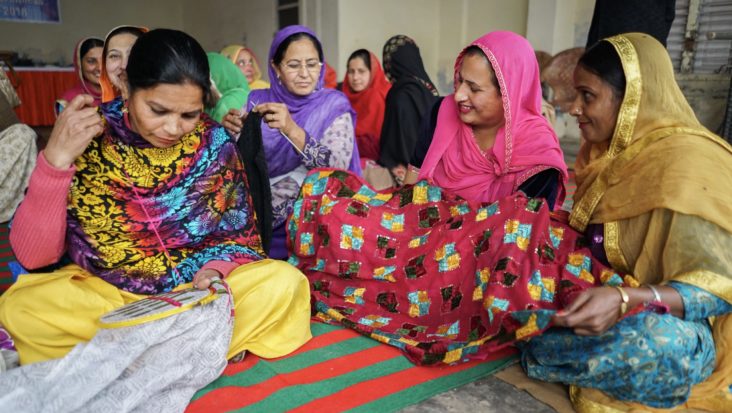by Nivi Jaswal, VLCE
posted Jan 12, 2021
She is last in the line. I keep wondering why they file up so quickly. Maybe because they’re asked too often to “fall in line” and “wait their turn” that now they do it almost automatically, without even being asked to do so. Anyway, I wait patiently. In my culture, we don’t shake hands. Instead, we fold our hands and use a term, similar to Namaste (lit., “I see you”) called “Sat Sri Akal” (lit., “That Who Is Timeless Is The Truth”).
And, now it is her turn.
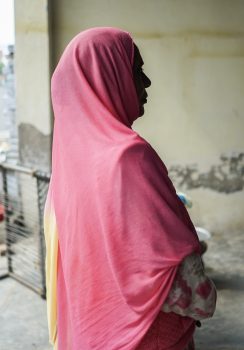
She is shy. Her scarf is wrapped around her head with a corner of it pulled in between her teeth. Maybe she is anxious? It’s quite a windy day—maybe she doesn’t want the scarf to fly away. Oh no! — that would be disrespectful. In my culture, women cover their heads, especially when inside a Gurudwara (a Sikh temple; lit., “The Door to the Guru”).
I start talking to her and she opens up about her story.
In her sixties, Pal Kaur, is the primary wage earner of her family. She has always been entrepreneurial. She leads a small network of women handicraft artisans for a cluster of villages. Wow, I thought to myself, those are serious leadership skills considering how conservative and patriarchal this rural part of Northwestern India tends to be. She had learned how to survive and shine.
Married at a very young age, she was bullied because of her dark skin. In my culture, a dark complexion means lower prospects of marriage. She has learned how to hide—standing last in line, waiting her turn, waiting patiently, hiding her beautiful face behind her scarf.
Pal embroiders for a small wage. Her wrinkled hands carry the weight of around 600 years of cultural heritage. Every tapestry takes a minimum of three months to make and if she’s fortunate, she will get $5 for it. The agents who come from the “Big City” are all male and they negotiate and push, using all means necessary.
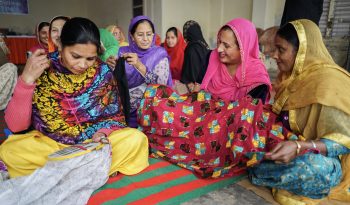
I’m there to understand why Pal is in pain. She has brain fog, anxiety, and feels lightheaded when she skips meals—which is often—not entirely out of choice. Her hands shake uncontrollably. The tremor means she can’t hold her tapestry needle straight. The tremor means no food for her family. Her daughter-in-law helps her some but she’s too young to go from village to village collecting tapestries. In my culture, young brides are a family’s pride and honor. You don’t send them to work door-to-door. Their primary ambition must be to give birth to sons.
Pal speaks Punjabi, my mother tongue. She listens wide-eyed about information on dairy. She is confused because ghee, milk, and yogurt are the mainstay of her frugal diet. I urge her to try this on for a couple months—no dairy, no oil, no salt and sugar. Only seasonal fruits and vegetables from her garden patch and from the vegetable seller who comes by weekly.
She holds my hand and looks at me imploringly as if to say—I trust you. I will try. I need my health because without it, my family has no hope.
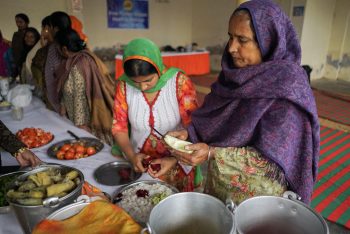
My visits to villages in rural India have offered invaluable insights in the development of my plant-based journey. As part of the India fieldwork of my Massachusetts-based non-profit, The Virsa Foundation Inc. (an independent member organization of the Plant Pure Communities International Network), we have adopted over five villages and, so far, impacted approximately 200 rural women artisans since 2017. These Phulkari Artisans are the custodians of world handicraft heritage and yet live in some of the most nutritionally insecure communities in the world. An ongoing fascination with dairy and a rapid expansion of junk food chains is not only eroding their health but also taking away their ability to carry on already endangered creative folklore and ancient handicraft traditions.
Our food choices go a long way in determining not just our health and happiness outcomes but over generations can modify our culture and creative resilience beyond recognition!
To know more about Pal Kaur’s story and the impact of a plant based diet on her health, watch this short 6-minute video.
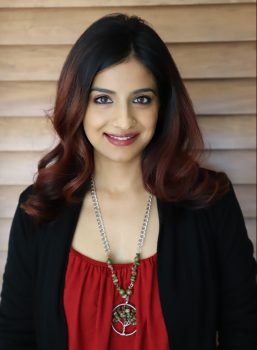
Nivi Jaswal has over 15 years of international corporate experience in brand management and marketing for consumer goods (Unilever), life sciences (Boston Scientific) and the media and research industry (WPP). She has lived and worked in seven different countries and visited 47—and can’t wait to start traveling again once our world is safer! She is also a Board Certified Health & Wellness Coach trained at the Mayo Clinic, a Certified Lifestyle Medicine Coach (American College of Lifestyle Medicine), and a Main Street Vegan Academy Master Vegan Lifestyle Coach and Educator.
After personally witnessing the power of a whole food, plant-based lifestyle in reversal of chronic illness, she started a brand strategy and business consulting practice which is solely focused on vegan nonprofits and for-profits, touching across plant-based nutrition, climate change, lifestyle choices, and sustainability.
Nivi also runs The Virsa Foundation Inc., a 501c3 nonprofit in the Boston area, focused on whole food, plant-based lifestyle research programs and intervention for underserved communities, especially women of color, in India (where Nivi is originally from) and USA (her adopted home). She is currently leading an ethnographic research program focused entirely on low income, nutritionally underserved women of color in the US. The JIVINITI Research Program will offer key insight into behavior change under conditions of socioeconomic oppression and imminent climate refugeeism. While processed foods tend to focus on those who can pay, Nivi fervently believes that businesses with compassion embedded in their mission cannot afford to ignore those who are often “zip-coded” out of emergent health and wellness options.
Nivi has recently founded the JIVINITI Women’s Coalition, which is partnering with diverse women’s led organizations in the U.S. and globally and appealing the incoming Biden-Harris administration to pivot towards a plant-powered economy.
Social Media Links:

